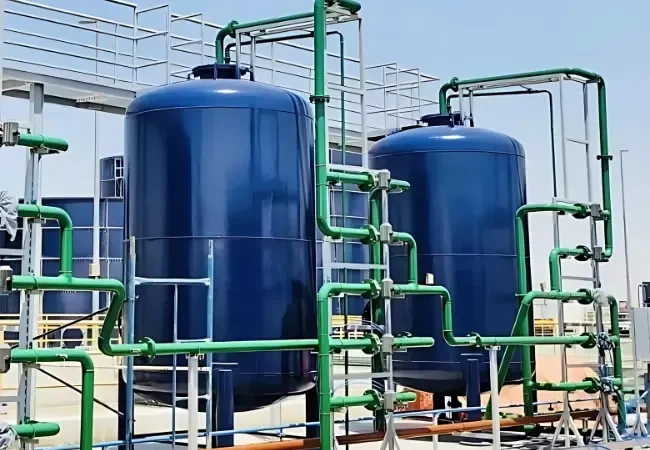Removing Silica from Industrial Water
Silica removal is a critical process in water treatment, especially for applications involving high-pressure steam boilers and cooling water systems. Silica, when present in high concentrations, can lead to significant operational issues, including reduced efficiency and potential damage to equipment.
High-Pressure Steam Boilers:
- Volatility: Silica is volatile and can carry over into the vapor phase in high-pressure steam boilers.
- Turbine Impact: It can deposit on turbine blades as a glassy, hard scale. This scaling reduces the efficiency of the turbine by creating a barrier to efficient energy transfer.
Heat Exchangers in Cooling Water Systems:
- Efficiency Threat: High silica content can affect the efficiency of heat exchangers by forming silica-based scales. These scales are particularly problematic as they are hard to remove and can significantly hinder heat transfer.
- Cycle of Concentration Limitation: Silica can limit the effectiveness of the cooling tower’s cycle of concentration, impacting overall system performance and operational costs.
Our Approach to Silica Removal
At Alantech, we utilize advanced technologies to address these challenges effectively.
Ion Exchange Resin Technology:
- Strong-Base Anion Exchange Resin: We utilize a strong-base anion exchange resin specifically designed for removing silica from water. This resin is highly effective at reducing ionic silica concentrations to parts-per-billion (ppb) levels.
- Hydroxide-Based Cycle: Since silica is a weak acid, it is efficiently removed through a hydroxide-based ion exchange process, ensuring nearly complete removal.
System Components:
- Mineral Tanks: Silica ion-exchange systems are typically composed of durable and corrosion resistant mineral tanks that house the resin.
- Corrosion-Resistant Materials: We use materials such as FRP (Fiberglass Reinforced Plastic) tanks and rubber-lined steel tanks to ensure longevity and resistance to corrosion. Valves and piping are also selected for their resistance to corrosion, with automation valves and PVC or rubber-lined face piping being common choices.
Request Information

Water Treatment Systems
- Reverse Osmosis plant
- Multi Media Filter
- High Rate Solid Contact Clarifier - HRSCC
- PRO ATHENA
- BEV Systems
- PRO MINI
- HERO Modular Systems
- SeaTECH Series
- SKYLINE Seawater RO
- SeaPRO E-Series
- Turbidity Treatment
- Mineral Dosing
- Iron Removal
- Seawater Desalination
- Brackish Water Reverse Osmosis (RO)
- Mixed Bed Deionizer
- Electrodeionization (EDI)
- Ozonation & UV
- Closed Circuit Reverse Osmosis
- Sewage Treatment Plant (STP)
- Effluent treatment Plant (ETP)
- Odour Control System
- Anaerobic Reactor (UASBR)
- DAF - Dissolved Air Flotation
- MBBR-Effluent treatment
- Membrane Bio Reactor
- Continuous Fill Batch Reactor
- Sequential Batch Reactor (SBR)

